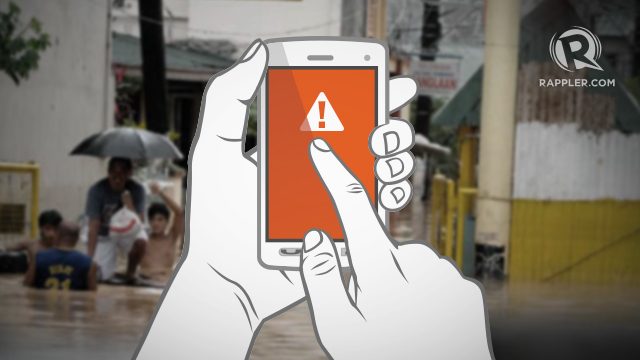SUMMARY
This is AI generated summarization, which may have errors. For context, always refer to the full article.

MANILA, Philippines – Nearly 10 months after Republic Act 10639 or The Free Mobile Disaster Alerts Act was signed by President Benigno Aquino III, the law could not be implemented yet.
While the law has already been signed on June 20, 2014, it still cannot be fully implemented as its Implementing Rules and Regulations (IRR) is still being reviewed. (READ: Will the free mobile disaster alerts law finally be implemented?)
The law mandates all telecommunications service providers (Telcos) to send free mobile alerts before disasters like typhoons happen. (READ: Free mobile alerts during disasters mandated)
Telcos unable to comply
On Monday, April 13, the National Telecommunications Commission (NTC) conducted its third public hearing to discuss remaining issues surrounding the law’s IRR. The National Disaster Risk Reduction and Management Council (NDRRMC) and major Telcos attended the hearing.
While concerns during the previous hearing were addressed, another issue came up: a provision in the law that lists down minimum system requirements that limits the capability of Telcos to comply.
“Some of the items enumerated here in [section] 5.2.1 tend to be equipment-specific. Based on the input from our technical team, these will more or less limit our capability to comply [because] certain provisions here are leaning towards certain equipment,” Melvin Santos, representative from Globe Telecom said.
Major Telcos reiterated that even without the system requirements the IRR is already sufficient. Telcos representatives noted the basic system that will enable them to comply already exists. If improvements are needed, the protocols can just be added in the annexes “without disrupting the IRR,” they added.
Retain criteria
But Edgardo Cabarios, the representative of NTC, said the minimum requirements should be retained.
“If perhaps, this is too specific, it can be generalized. But removing some sort of criteria will make it broad. You will lose direction if you don’t set minimum criteria,” Cabarios explained.
He added that in the end, it all boils down to what NDRRMC, the user of the system, needs. “Let us wait for NDRRMC to come up with its minimum requirements,” Cabarious said.
Once the issue on the contentious provision is settled within the week, the IRR can already be signed and implemented, Cabarios said.
NDRRMC executive director Alexander Pama earlier said the IRR should be hazard-specific, area-focused, time-bound, technology-neutral, and cost-effective.
When typhoons Ruby (Hagupit) and Seniang (Jangmi) hit the country in December 2014, the public complained they did not receive any alerts, according to Pama.
The NTC targets the signing of the IRR on the third week of April, two months before the rainy season starts. – Rappler.com
Hands holding smartphone image from Shutterstock
Add a comment
How does this make you feel?
There are no comments yet. Add your comment to start the conversation.